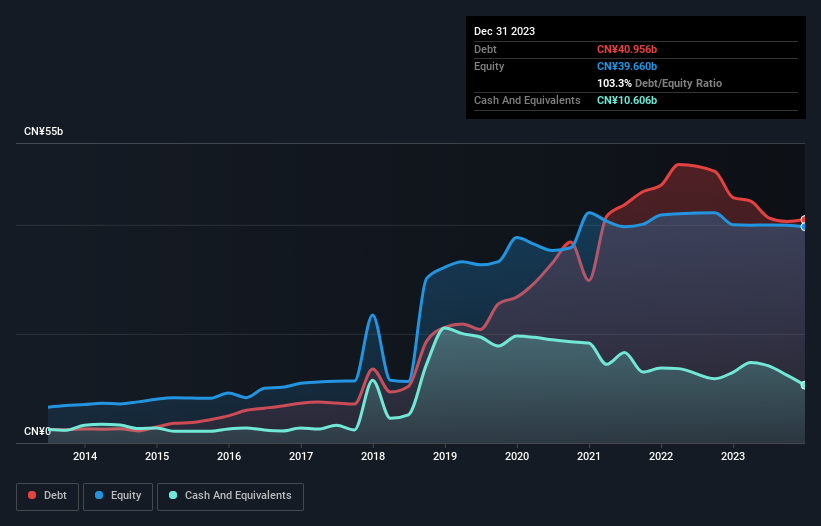- China
- /
- Specialty Stores
- /
- SHSE:600655
Shanghai Yuyuan Tourist Mart (Group) (SHSE:600655) Has No Shortage Of Debt

The external fund manager backed by Berkshire Hathaway's Charlie Munger, Li Lu, makes no bones about it when he says 'The biggest investment risk is not the volatility of prices, but whether you will suffer a permanent loss of capital.' So it might be obvious that you need to consider debt, when you think about how risky any given stock is, because too much debt can sink a company. We can see that Shanghai Yuyuan Tourist Mart (Group) Co., Ltd. (SHSE:600655) does use debt in its business. But should shareholders be worried about its use of debt?
When Is Debt A Problem?
Debt is a tool to help businesses grow, but if a business is incapable of paying off its lenders, then it exists at their mercy. Ultimately, if the company can't fulfill its legal obligations to repay debt, shareholders could walk away with nothing. However, a more common (but still painful) scenario is that it has to raise new equity capital at a low price, thus permanently diluting shareholders. Of course, the upside of debt is that it often represents cheap capital, especially when it replaces dilution in a company with the ability to reinvest at high rates of return. The first thing to do when considering how much debt a business uses is to look at its cash and debt together.
See our latest analysis for Shanghai Yuyuan Tourist Mart (Group)
What Is Shanghai Yuyuan Tourist Mart (Group)'s Debt?
The image below, which you can click on for greater detail, shows that Shanghai Yuyuan Tourist Mart (Group) had debt of CN¥41.0b at the end of December 2023, a reduction from CN¥45.0b over a year. On the flip side, it has CN¥10.6b in cash leading to net debt of about CN¥30.4b.

How Strong Is Shanghai Yuyuan Tourist Mart (Group)'s Balance Sheet?
According to the last reported balance sheet, Shanghai Yuyuan Tourist Mart (Group) had liabilities of CN¥59.5b due within 12 months, and liabilities of CN¥24.9b due beyond 12 months. Offsetting this, it had CN¥10.6b in cash and CN¥17.8b in receivables that were due within 12 months. So its liabilities total CN¥56.0b more than the combination of its cash and short-term receivables.
The deficiency here weighs heavily on the CN¥22.3b company itself, as if a child were struggling under the weight of an enormous back-pack full of books, his sports gear, and a trumpet. So we'd watch its balance sheet closely, without a doubt. After all, Shanghai Yuyuan Tourist Mart (Group) would likely require a major re-capitalisation if it had to pay its creditors today.
In order to size up a company's debt relative to its earnings, we calculate its net debt divided by its earnings before interest, tax, depreciation, and amortization (EBITDA) and its earnings before interest and tax (EBIT) divided by its interest expense (its interest cover). The advantage of this approach is that we take into account both the absolute quantum of debt (with net debt to EBITDA) and the actual interest expenses associated with that debt (with its interest cover ratio).
Strangely Shanghai Yuyuan Tourist Mart (Group) has a sky high EBITDA ratio of 24.1, implying high debt, but a strong interest coverage of 1k. So either it has access to very cheap long term debt or that interest expense is going to grow! Shareholders should be aware that Shanghai Yuyuan Tourist Mart (Group)'s EBIT was down 31% last year. If that decline continues then paying off debt will be harder than selling foie gras at a vegan convention. The balance sheet is clearly the area to focus on when you are analysing debt. But ultimately the future profitability of the business will decide if Shanghai Yuyuan Tourist Mart (Group) can strengthen its balance sheet over time. So if you're focused on the future you can check out this free report showing analyst profit forecasts.
But our final consideration is also important, because a company cannot pay debt with paper profits; it needs cold hard cash. So we always check how much of that EBIT is translated into free cash flow. Over the last three years, Shanghai Yuyuan Tourist Mart (Group) saw substantial negative free cash flow, in total. While investors are no doubt expecting a reversal of that situation in due course, it clearly does mean its use of debt is more risky.
Our View
On the face of it, Shanghai Yuyuan Tourist Mart (Group)'s EBIT growth rate left us tentative about the stock, and its level of total liabilities was no more enticing than the one empty restaurant on the busiest night of the year. But on the bright side, its interest cover is a good sign, and makes us more optimistic. We think the chances that Shanghai Yuyuan Tourist Mart (Group) has too much debt a very significant. To our minds, that means the stock is rather high risk, and probably one to avoid; but to each their own (investing) style. There's no doubt that we learn most about debt from the balance sheet. However, not all investment risk resides within the balance sheet - far from it. Case in point: We've spotted 3 warning signs for Shanghai Yuyuan Tourist Mart (Group) you should be aware of, and 1 of them makes us a bit uncomfortable.
When all is said and done, sometimes its easier to focus on companies that don't even need debt. Readers can access a list of growth stocks with zero net debt 100% free, right now.
New: Manage All Your Stock Portfolios in One Place
We've created the ultimate portfolio companion for stock investors, and it's free.
• Connect an unlimited number of Portfolios and see your total in one currency
• Be alerted to new Warning Signs or Risks via email or mobile
• Track the Fair Value of your stocks
Have feedback on this article? Concerned about the content? Get in touch with us directly. Alternatively, email editorial-team (at) simplywallst.com.
This article by Simply Wall St is general in nature. We provide commentary based on historical data and analyst forecasts only using an unbiased methodology and our articles are not intended to be financial advice. It does not constitute a recommendation to buy or sell any stock, and does not take account of your objectives, or your financial situation. We aim to bring you long-term focused analysis driven by fundamental data. Note that our analysis may not factor in the latest price-sensitive company announcements or qualitative material. Simply Wall St has no position in any stocks mentioned.
About SHSE:600655
Shanghai Yuyuan Tourist Mart (Group)
Shanghai Yuyuan Tourist Mart (Group) Co., Ltd.
Slight with moderate growth potential.


